Dagstuhl-Seminar 23381
Visualization and the Humanities: Towards a Shared Research Agenda
( 17. Sep – 22. Sep, 2023 )
Permalink
Organisatoren
- Johanna Drucker (University of California at Los Angeles, US)
- Jason Dykes (City - University of London, GB)
- Mennatallah El-Assady (ETH Zürich, CH)
- Uta Hinrichs (University of Edinburgh, GB)
- Florian Windhager (Donau-Universität Krems, AT)
Kontakt
- Andreas Dolzmann (für wissenschaftliche Fragen)
- Christina Schwarz (für administrative Fragen)
Programm
Large-scale digitization initiatives of cultural materials have fueled an interest in both computer science and humanist research fields to develop advanced computational methods specifically tailored to humanities research. In this context, recent years have seen a particular excitement around visualization (VIS) as a method to facilitate humanist research practices, visible in a wave of surveys and reflections from both humanist and visualization perspectives (Benito-Santos, 2020; Bradley, 2018; Drucker, 2020; Hinrichs, 2019; Jänicke, 2017; Windhager, 2018).
From a digital humanities’ (DH) perspective, visualization appears as a fascinating option to make sense of cultural collections and subject matters at a large scale. Visualization has the potential to complement traditional humanities (TH) research approaches that typically focus on the in-depth interpretation of selected cultural materials. From the perspective of visualization researchers, the humanities provide a unique application domain for designing and studying the impact of visualization tools and related sense-making processes. Maybe more importantly, however, the humanities stimulate methodological and conceptual innovation in the visualization field, by formulating novel demands on visualization while criticizing standard visualization approaches that have their roots in the sciences. However, conceptualizing and conducting impactful research that mutually benefits and fuels all fields involved in this highly interdisciplinary area is an enormous challenge. Visualization scholars depend on humanities experts to adapt and tailor technologies for a complex and critical application field, but they also suffer from a dominant unidirectional focus on visualization ‘as a service’, which hampers the development of novel, complementary and mutually enriching research perspectives (Hinrichs, 2019). At the same time, many humanists warn of visualizations’ roots in the quantitative sciences which disrupts traditional humanist methods of knowledge generation and discourse and introduces non-trivial shifts in existing topologies of knowledge-power, creating epistemic, political, ethical, pedagogical, and cultural tensions (Allington, 2016; D’Ignazio, 2020; Marche, 2012); scholars have warned of intellectual Trojan horses (Drucker, 2011), the curse of counting (Da, 2019), and unhappy neighborhoods (Correll, 2019).
Visualization and the humanities, indeed, seem to subscribe to fundamentally different research philosophies, approaches and methods. There is also a lack of explication and understanding of what characterizes methodologies across the fields and how to manage the complex mixture of methodological similarities and disparities. This not only challenges research collaborations at the intersection of visualization and the humanities and complicates the identification of core foundations and methods to teach, but also hampers the formulation of research outcomes and a shared research agenda to drive forward future interdisciplinary initiatives in this area. In order to unleash and direct synergies inherent in transdisciplinary research and teaching across the humanities and visualization we need to share, converse and reflect on each others’ research approaches, methods and processes and how these impact and shape research at the intersection of the humanities and visualization. Along these lines, this Dagstuhl Seminar aimed at addressing three main questions and related challenges:
- DG⇒VIS: How do humanistic approaches impact visualization research and practice?
- VIS⇒DH: How does visualization impact knowledge production in the humanities?
- DH⇒VIS: Leveraging synergies between the fields, what could a shared research agenda look like?
References
- Allington, D., Brouillette, S., and Golumbia, D., 2016. Neoliberal tools (and archives): A political history of digital humanities. LA Review of Books.
- Benito-Santos, A., and Sánchez, R. T., 2020. A data-driven introduction to authors, readings, and techniques in visualization for the digital humanities. IEEE Computer Graphics and Applications 40(3), pp.45–57.
- Bradley, A. J., El-Assady, M., Coles, K., Alexander, E., C. M., Collins, C., Jänicke, S., and Wrisley, D. J., 2018. Visualization and the digital humanities: Moving towards stronger collaborations. IEEE Computer Graphics and Applications 38(6), pp.26–38.
- Correll, M., 2019. Counting, collaborating, and coexisting: Visualization and the digital humanities. online:, 2019.
- Da, N. Z., 2019. The Computational Case against Computational Literary Studies. Critical Inquiry 45(3), pp. 601–639. Publisher: The University of Chicago Press.
- Drucker, J., 2011. Humanities approaches to graphical display. Digital Humanities Quarterly 5(1).
- Drucker, J., 2020. Visualization and Interpretation: Humanistic Approaches to Display. MIT Press.
- D’Ignazio, C., and Klein, L. F., 2020. Data Feminism. MIT Press.
- Hinrichs, U., Forlini, S., and Moynihan, B., 2019. In defense of sandcastles: Research thinking through visualization in digital humanities. Digital Scholarship in the Humanities 34, Supplement 1, i80–i99.
- Jänicke, S., Franzini, G., Cheema, M. F., and Scheuermann, G., 2017. Visual text analysis in digital humanities. Computer Graphics Forum 36(6), pp. 226 – -250.
- Marche, S., 2012. Literature is not data. against digital humanities. LA Review of Books.
- Windhager, F., Federico, P., Schreder, G., Glinka, K., D. M., Miksch, S., and Mayr, E., 2018. Visualization of cultural heritage collection data: State of the art and future challenges. Transactions on Visualization and Computer Graphics 25(6), pp. 2311––2330.
 Johanna Drucker, Jason Dykes, Mennatallah El-Assady, Uta Hinrichs, and Florian Windhager
Johanna Drucker, Jason Dykes, Mennatallah El-Assady, Uta Hinrichs, and Florian Windhager
Visualization has become a vital element in (digital) humanist research practices. However, the value and impact of research at the intersection of visualization and the humanities is still debated across fields. Visualization scholars critique the service-oriented focus on visualization as a tool to facilitate humanist research, which hampers the discovery of complementary and mutually enriching research perspectives for all fields involved. At the same time, humanists warn of visualizations’ roots in the quantitative sciences which introduce non-trivial shifts in the topology of knowledge-power, creating epistemic, political, ethical, pedagogical, and cultural tensions. Building on advances in this young and highly interdisciplinary research area, the time seems ripe for discussing how to leverage synergies and how to build productively on tensions between methodologies at the intersection of visualization and (digital) humanities fields that span a vast spectrum of research philosophies and methods.
This Dagstuhl Seminar will bring together researchers and practitioners from the fields of visualization, computer science, the humanities, and design with the goal to:
- Reflect on existing research methods within visualization and the humanities,
- Identify tensions and synergies between the different fields, and
- Develop concrete avenues that address and leverage these.
The themes of the seminar will revolve around the following challenges:
How do humanistic approaches impact visualization research and practice?
Academic discourse has only started to explore how humanities’ research perspectives might affect and advance visualization research (e.g., by promoting critical considerations of existing research paradigms in visualization). At this seminar, we will explore productive disruptions and advances that humanist approaches introduce to visualization research and research methods.
How does visualization impact knowledge production in the humanities?
Many humanists acknowledge the potential of digital methods, but these are still considered a disruption of the traditional humanities. Reflecting on how the use of visualization has facilitated research in the humanities – and where it is jeopardizing established epistemologies – we will discuss the role of visualization as part of humanist knowledge production.
How can we leverage synergies between the fields to establish a shared research agenda?
Bringing together researchers from visualization and humanist fields at Dagstuhl creates a unique opportunity to discussing systematically questions around synergies between the fields, what shared methodologies might look like, and how to promote collaboration.
The outcomes of this seminar will pave the way for (1) the development of a transdisciplinary research program at the intersection of the humanities and visualization, (2) the generation of comparable and transferable research outcomes and foundations, rather than point solutions, and (3) pedagogical approaches to help teach best practices in this interdisciplinary field.
 Johanna Drucker, Jason Dykes, Mennatallah El-Assady, Uta Hinrichs, and Florian Windhager
Johanna Drucker, Jason Dykes, Mennatallah El-Assady, Uta Hinrichs, and Florian Windhager
- Alfie Abdul-Rahman (King's College London, GB) [dblp]
- Derya Akbaba (Linköping University, SE)
- Alejandro Benito-Santos (University of Salamanca, ES) [dblp]
- Charles Berret (Linköping University, SE) [dblp]
- Mark-Jan Bludau (FH Potsdam, DE) [dblp]
- Richard Brath (Uncharted Software - Toronto, CA) [dblp]
- Michael Correll (Northeastern University - Portland, US) [dblp]
- Jeremy Douglass (University of California - Santa Barbara, US) [dblp]
- Johanna Drucker (University of California at Los Angeles, US) [dblp]
- Mennatallah El-Assady (ETH Zürich, CH) [dblp]
- Jean-Daniel Fekete (INRIA Saclay - Orsay, FR) [dblp]
- Stefania Forlini (University of Calgary, CA) [dblp]
- Linda Freyberg (DIPF - Berlin, DE)
- Katrin Glinka (Freie Universität Berlin, DE) [dblp]
- Nicole Hengesbach (University of Warwick - Coventry, GB) [dblp]
- Uta Hinrichs (University of Edinburgh, GB) [dblp]
- Aida Horaniet Ibanez (University of Luxembourg, LU)
- Jan Horstmann (Universität Münster, DE) [dblp]
- Leonardo Impett (University of Cambridge, GB) [dblp]
- Mathieu Jacomy (Aalborg University Copenhagen, DK) [dblp]
- Lauren Klein (Emory University - Atlanta, US) [dblp]
- Rabea Kleymann (TU Chemnitz, DE) [dblp]
- Steffen Koch (Universität Stuttgart, DE) [dblp]
- Houda Lamqaddam (KU Leuven, BE) [dblp]
- Johannes Liem (Donau-Universität Krems, AT) [dblp]
- Yanni Loukissas (Georgia Institute of Technology - Atlanta, US) [dblp]
- Isabel Meirelles (The Ontario College of Art and Design University, CA) [dblp]
- Bridget Moynihan (Library and Archives Canada - Ottawa, CA) [dblp]
- Fabian Offert (University of California - Santa Barbara, US) [dblp]
- Georgia Panagiotidou (King's College London, GB) [dblp]
- David Pao (Royal College of Art - London, GB) [dblp]
- Geoffrey Rockwell (University of Alberta - Edmonton, CA) [dblp]
- Christophe Schuwey (Université de Bretagne Sud, FR)
- Bettina Speckmann (TU Eindhoven, NL) [dblp]
- Joris van Zundert (Huygens Institute - Amsterdam, NL) [dblp]
- Florian Windhager (Donau-Universität Krems, AT) [dblp]
Klassifikation
- Computation and Language
- Graphics
- Human-Computer Interaction
Schlagworte
- Humanities
- Visualization
- Digital Humanities
- Methodology
- Research program

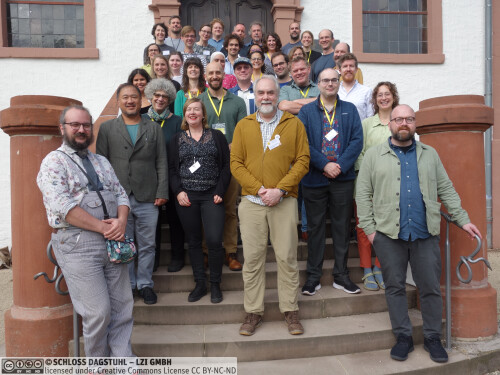
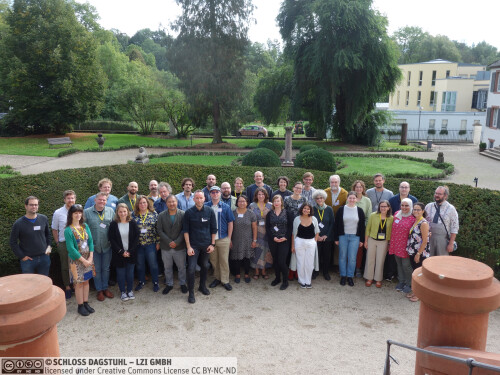
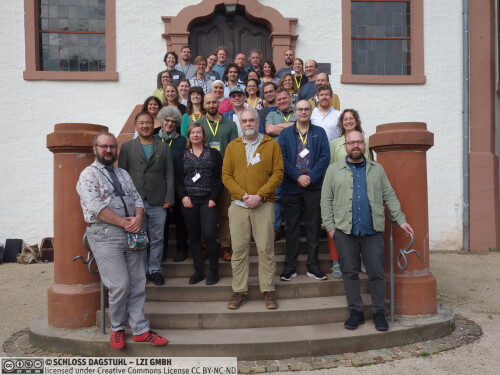
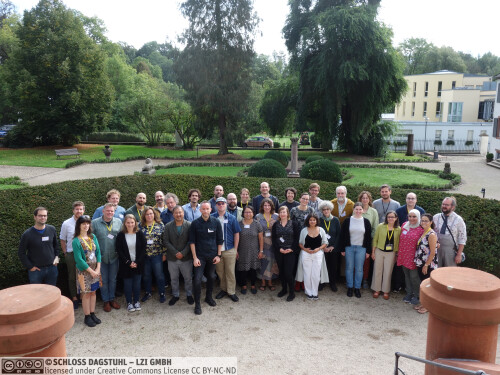
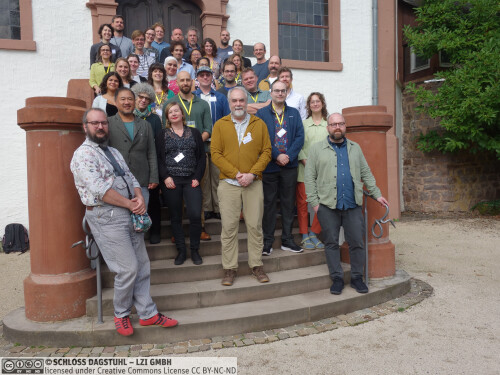
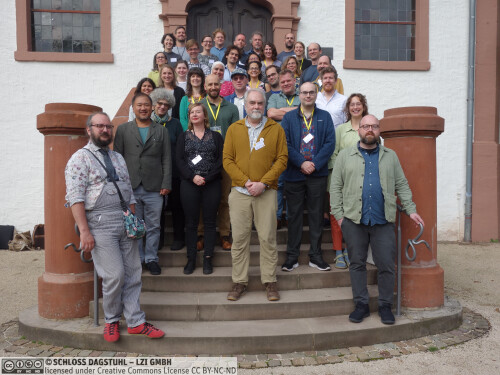
 Creative Commons BY 4.0
Creative Commons BY 4.0
